Welcome back to the British Genre Fiction Focus, Tor.com’s regular round-up of book news from the United Kingdom’s thriving speculative fiction industry.
This week, as Awards Watch continues with news of this year’s British Science Fiction Association Award shortlists, science fiction’s invisible women can be seen a little more clearly, whilst Best Novel contender Kameron Hurley makes a rare repeat appearance in the course of a single column.
I’ve also got the lovely cover art for The Wizard’s Promise, and later on, in Odds and Sods, Neil Gaiman is taking over the telly, Gollancz have a cheeky secret to reveal, Voyager have bought two novels from a former firewalker, and—sigh—the local libraries are getting it again.
Awards Watch: Back to the BSFAs
The shortlists for the BSFA’s annual awards were released last week, and what a relief it was to see some women acknowledged by the Association—and the members whose nominations the shortlists are drawn from—after 2013’s middle-aged white man extravaganza.
There were a few of those, of course: Christopher Priest, Paul McAuley and Gareth L. Powell all got the nod… but the contenders in the Best Novel category also included Kameron Hurley for God’s War and Ann Leckie for Ancillary Justice—both of which push out the boundaries as regards the representation of gender in the genre.
And according to Award boss Donna Scott, “The Shining Girls by Lauren Beukes, and the Booker-shortlisted A Tale for the Time Being by Ruth Ozeki, just failed to make the final shortlist.”
More recognition of science fiction’s formerly invisible women came by way of the Best Short Fiction shortlist, which honoured Nina Allen, Sofia Samatar, E. J. Swift and Tori Trusluw for their contribution to the form.
Last but not least, our own Liz Bourke was named one of just three nominees for Best Non-Fiction for her Tor.com column Sleeps with Monsters. How abominably awesome!
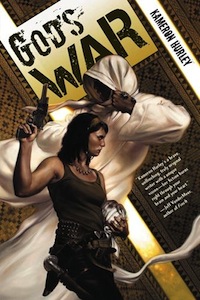
Long story short, the shortlists made for such a substantial improvement over last year’s unfortunate sausagefest that it’s tempting to call it a day right there, but Kameron Hurley warns that the longstanding problem isn’t suddenly solved:
Let’s be real. We’re two out of five on the best novel shortlist, which isn’t even parity. So I’m not going to hop up and down like “rah-rah no more sexism!” But it’s better than we’ve seen in a while, and in no small part because both God’s War and Ancillary Justice are core genre novels that earned a lot of love and support from the science fiction community. Every inch was earned.
Donna Scott was also cautiously optimistic, according to this article in The Guardian:
Science fiction as a genre is still a little skewed towards male writers in terms of the numbers of submissions to publishers, but the women are there. Just a few years ago, I could think of only one female science fiction writer who had a UK novel publishing deal, but there are more now, and there is a clamouring among fans to read something new. We want different voices and perspectives.
And by gum, we’re getting them. I can hardly express how happy I am about that, at last.
Lauren Beukes put her tuppence in too, saying that it was “fantastic to see so many women writers on the major genre award shortlists,” especially for “the kind of hard SF that is traditionally (wrongly) perceived as being a bit of a boy’s club.”
She went on to talk about the community’s part in making this happen:
What does make me happy is that it seems that all the debate on blogs and social media about how women writers are perceived, reviewed, published and nominated for awards seems to have actually had an effect in the real world. Or maybe we’ve just had a bumper crop of awesome this year. I’d like to think that the way we talk about this stuff matters and I’m thrilled to see such talented female writers getting recognition alongside their equally talented male peers.
This. This exactly!
Kameron Hurley, Worldbreaker
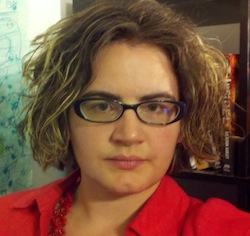
Kameron Hurley made the news for another reason this week: the Clarion West graduate has teamed up with the folks at Angry Robot for her next several novels. The Worldbreaker Saga is, according to the author’s comments on A Dribble of Ink, “Game of Thrones meets Fringe […] across three respectable doorstoppers.”
Passing odd, then, that her new deal is for “at least two books,” beginning with The Mirror Kingdom, which we already know quite a bit about:
On the eve of a recurring catastrophic event known to extinguish nations and reshape continents, a troubled orphan evades death and slavery to uncover her own bloody past… while a world goes to war with itself.
In the frozen kingdom of Saiduan, invaders from another realm are decimating whole cities, leaving behind nothing but ash and ruin. At the heart of this war lie the pacifistic Dhai people, once enslaved by the Saiduan and now courted by their former masters to provide aid against the encroaching enemy.
Stretching from desolate tundra to steamy, semi-tropical climes seething with sentient plant life, this is an epic tale of blood mages and mercenaries, emperors and priestly assassins who must unite to save a world on the brink of collapse. As the dark star of the cataclysm rises, an illegitimate ruler struggles to unite a country fractured by civil war; a precocious young fighter is asked to betray his family to save his skin; and a half-Dhai general must choose between the eradication of her father’s people or loyalty to her alien Empress.
Through tense alliances and devastating betrayals, the Dhai and their allies attempt to hold against a seemingly unstoppable force as enemy nations prepare for a coming together of worlds as old as the universe itself.
In the end, only one world will rise—and many will perish.
Frustratingly, here in the UK we’re still waiting (less patiently by the day) for Infidel and Rapture to be released; that The Mirror Empire stands to beat the latter of those narratives to bookstores when it’s published worldwide this very September is no laughing matter.
Cover Art Corner: The Wizard’s Promise
Strange Chemistry recently revealed Sarah K. Coleman’s cover art for The Wizard’s Promise by Cassandra Rose Clarke… and it’s simply exquisite, don’t you think?
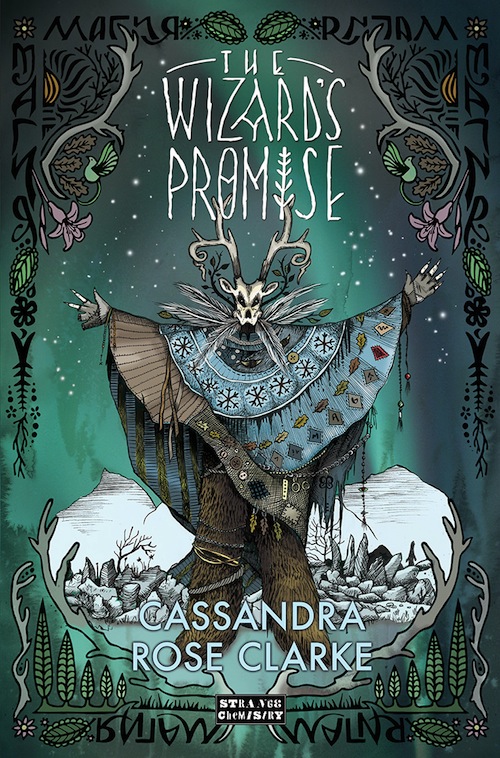
You can see more of the artist’s work on Inkymole, and I’ve got a bit about the book for you, too:
All Hanna Euli wants is to become a proper witch—but unfortunately, she’s stuck as an apprentice to a grumpy fisherman. When their boat gets caught up in a mysterious storm and blown wildly off course, Hanna finds herself further away from home than she’s ever been before.
As she tries to get back, she learns there may be more to her apprentice master than she realized, especially when a mysterious, beautiful, and very non-human boy begins following her through the ocean, claiming that he needs Hanna’s help.
The Wizard’s Promise begins The Hanna Duology, which I understand shares a world with The Assassin’s Curse and The Pirate’s Wish—though I’ll come right out and admit I’ve read neither of these novels, despite the best of intentions. Anyone willing to recommend them?
The Wizard’s Promise be published in the UK this May, in any case.
Odds and Sods
Neil Gaiman is about to take over the telly! According to his blog, we “can expect a little smidge of news about two of my books being adapted into two TV series very soon, with a third to follow. Real news, very soon, promise.” I’ll keep you up to speed, readers.
Looks like the very public bloodletting behind the bookcases of Waterstones has lessened some of the financial pressure on Britain’s biggest bookseller. Managing Director James Daunt has said that the company’s recovery is “on track” after its losses more than halved in 2013.
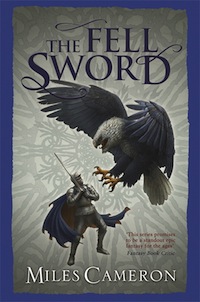
Gollancz revealed a tongue-in-cheek sort of secret this week: that Miles Cameron, author of The Traitor Son Cycle, is actually a pen name for Christian Cameron, the bestselling historical novelist.
HarperCollins Voyager has bought two new fantasy novels—The Vagrant and The Malice—from debut author Peter Newman, a former firewalker.
Last week I wondered what impact the apparent collapse of Quercus might have on its genre fiction imprint Jo Fletcher. Jo Fletcher herself says it’s too early to tell, but reading between the lines of her open letter, there should be news about a resolution soon.
The winner of the Costa Book of the Year Award was announced… and it wasn’t Kate Atkinson! Oh well. Instead, the £30,000 prize went to Nathan Filer for his debut, The Shock of the Fall.
Not to end on a downer or anything, but be warned: local libraries are getting it again. Cuts in Birmingham mean that the library budget will be down £2m in 2014, whilst in Scotland the home of the internationally recognised Wigtown Book Festival has had its service hugely reduced.
Niall Alexander is an extra-curricular English teacher who reads and writes about all things weird and wonderful for The Speculative Scotsman, Strange Horizons, and Tor.com. He’s been known to tweet, twoo.










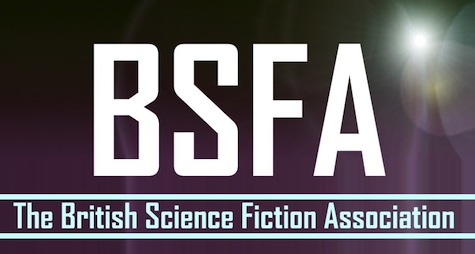
@niall: Personally, I’m inclined to think that Leckie will win this one, though I really ought to read the Hurley. As much as I like Priest’s fiction, he already has four trophies (five, with his win for “Palely Loitering”) while Powell comes under entertaining but slight. Though McAuley is long, long overdue his BSFA, I suspect that one of the books from his upcoming Jackaroo duology might be a winner.
In short fiction, I enjoyed The Lowest Heaven so the E. J. Swift is currently in front for me, though I haven’t read Spin yet. I don’t really consider myself qualified to judge artwork (though if I had to pick, I’d go with the Metropolis poster). It looks like there’s strong competition in the non-fiction, however, I haven’t read Unearthed or Wonderbook.
Both the Hurley and the Leckie are quite good. I haven’t read the 3 “guys” books. I first read God’s War because of a recommendation from Liz Bourke and I read Ancillary Justice because of recommendations from Hurley & Bourke.
So, Bourke’s nomination also is quite pleasing and quite well deserved. Her column has certainly had an impact on my reading selections.
Niall, I can’t recommend Cassandra Rose Clarke’s The Assassin’s Curse and The Pirate’s Wish enough. They’re a lot of fun but you must read both books as if they were one long novel. Don’t forget to check out the short stories inbetween because they expand the universe and some character’s backstories, too.
In case you need more than that to be convinced, here are my reviews for the series:
– The Assassin’s Curse
– The Witch’s Betrayal (short story)
– The Automaton’s Treasure (short story)
– The Pirate’s Wish
I think it’s much more enjoyable if you read them in this specific order. Hope you will give it a try.
Ok, the quote that really knocked me out of this was “Let’s be real. We’re two out of five on the best novel shortlist, which isn’t even parity.”
What would the alternative be? 3 out of 5, which isn’t parity either? 2/5 is the closest you can get to parity when you have an odd number.
So, getting hypothetical, otherwise we’d never agree; if the objectively best stories were written by males, would this still be sexist?
@5: Unfortunately, that’s the way some people seem to think.
@Objectively? No, it wouldn’t be.
But the thing is, there is precious little that is objective in fiction, and very much that is subjective. Do you really think that, for decades upon decades, women haven’t been represented in equal proportion in genre awards because their work has just somehow, as a monolith, not been up to par?
As a best case, you have panelists selecting books that confirm the way they view society, either in terms of their place in it or in their outlook of the world, so they don’t notice the talent out there that doesn’t take place in their bubble; as a worst case, you have those guys who think “women don’t write sci-fi” or “women can’t write convincing fight scenes/good stories/etc” or “this woman told me she didn’t like it when I grabbed her breast at that con, so I won’t vote for her nomination because she should totally have found that charming and non-threatening.”
Re: Hurley’s comment, I can’t help but think she meant in light of recent years. 2/5 this year is 2/10 in the past two years.
@7: Do you really think that, for decades upon decades, men haven’t been represented in equal proportion in romance genre awards because their work has just somehow, as a monolith, not been up to par?
http://en.wikipedia.org/wiki/RITA_Award
“The RITA is the most prominent award given throughout the genre of romance fiction. It is presented by Romance Writers of America.”
The contest rules say nothing about gender.
Over a hundred winners’ names on that Wikipedia page. Not a single male name that I noticed.
Is anybody wailing and gnashing their teeth, and writing blogs expressing their disgruntlement at this brutal crushing of the aspirations of an entire gender? Setting up special awards for mens’ romance writing? Not that I noticed. Personally, I reckon that men are probably much less interested in writing romance than women are, so I’d expect a big discrepancy in the number of winners. I’m actually surprised that it’s so big, but . It’s not any more relevant than an occasional all-male shortlist in science fiction, a genre in which I should think men are more interested in than women, though the difference is obviously not as great as in romance.
Is mens’ romance writing worse as a monolith? Almost certainly yes, given that fewer of them are doing it. And I would think the same probably applies to womens’ science fiction. There are many fine female SF writers, but the sex that spills more ink is probably going to get more of the awards if they are judged fairly.
But some folks can’t or won’t see the obvious, and that is why we get so many absurd complaints whenever there’s an all-male shortlist or whatever.
@8 Gerry__Quinn
My understanding is that most male romance writers, and there are quite a few, write under an assumed female name as most romance readers don’t think men can write decent romance. Scenario sound at all familiar? Sexism is no better in that context than it is in science fiction and the justifications for it’s perpetuation just as inadequate. It is therefore a rather poor argument to use in support of the ‘men just write better science fiction’ line.
And how on earth can anyone seriously suggest that we have a way of objectively measuring the worth of fiction? One of the most obvious things you find looking at the history of fiction is that what is wildly popular when published may well not stand the test of time.
@9: I’m not going to go through a hundred authors. But I googled the six names in the ‘Best First Book’ award, the first section on the page, which was awarded from 2008-2013. And ‘Best First Book’ should obviously be an excellent straw in the wind regrading future gender representation in the romance genre. Each of the six presents a photograph – all are female. Unless they are masters of disguise or indulge in elaborate subterfuges (and these are *new* authors) they ARE all female or presenting as such.
I rest my case. The over-representation of women in the RITA awards is NOT the result of male authors pretending to be women. Try again.
@@@@@ 10 You have addressed one point I made so what about
‘Sexism is no better in that context than it is in science fiction and
the justifications for it’s perpetuation just as inadequate. It is
therefore a rather poor argument to use in support of the ‘men just
write better science fiction’ line.‘
I don’t know if anybody is better at anything or not, but it is annoying to see such complaints only when it benefits women, never when it doesn’t and always with the implicit assumption, that it is all somehow, men’s fault.
When even well known female authors do not enter for ‘genre’ things say
Jeanette Winterson or Atwood as it below a level of there cool i do wonder if the problem self generated as if those people do not do genre why would anyone else of the female genre want to be associated with it?
As to libraries politicians of all colours hate them and are happy to close them regardless of who is in power so this is not a case of something new, and in Birmingham is probably due to local mismangement of equal pay irregularites over a number of decades.
Personally I feel the best Sf/F novel by a woman last year was Stranger in Olondria by Sofia Samatar. I couldn’t finish Ancillary Justice and didn’t care for Gods War although I thought it well written I just found the main character too off putting. Of the novels nominated I would pick the The Adjutants as easily the best with the McAuley next.
@Gerry_Quinn
That’s an interesting perspective. I don’t think it’s a good comparison, and let me explain why:
You are speaking as if women are a tiny population of the readers of sci fi and fantasy. This is not the case.
Let’s talk statistics. Google ran a consumer survey awhile ago, and here’s a blog post from SFWA about it: http://www.sfwa.org/2014/01/reads-science-fiction/
43% of sci-fi readers online -this is just sci-fi, not fantasy- are women.
Do you think the discrepancy between the number of women reading, and the number of women writing, is that large?
Why is there still a prevailing opinion that sci-fi is a genre almost entirely read by men -I still occasionally get comments that suggest I’m one of maybe 10% of readers, though it’s much rarer than when I started reading sci-fi- if women are just 7 percentage points away from half the market (and account for more than half, if you include fantasy), and there is a huge body of women active in the sci-fi community?
The noise I’m hearing, what you sweetly call “wailing and gnashing of teeth,” is frustration by readers like me, who are sick of being told we don’t read this genre, despite the groaning bookshelves that say we do. It’s frustration by female authors who have been advised to work under gender neutral or male pen names in order to get readership and still face assumptions that they actually aren’t out there, publishing fiction; and by people frustrated with sexual harassment and lack of representation on panels at conventions. It’s frustration from people who don’t like to see their peers dismissed and underrepresented because of their gender, or race, or sexuality.
Sci-fi as a fandom and as a genre has made good recent progress against that weirdly dated stereotype lately, and it’s precisely because this “wailing and gnashing of teeth” has made people realize that female authors are reviewed less frequently than male authors, that LGBTQ voices, and people of color are underrepresented, and that all of the above are overlooked for awards because the people on the panels literally don’t have this writing on their horizons in proportion to how common it is, and how good some of it is.
The number of men who read romance is not 43%.
It’s 9%, according to the RWA, though perhaps it’s a little higher since that number is based off buyers. I’m linking to a Huffington Post article here, which links to both those statistics and includes a sub-section on making romance more male reader-friendly: http://www.huffingtonpost.com/maya-rodale/the-real-men-who-read-rom_b_4713546.html
I don’t read romances, so I don’t know anything about the genre’s inner politics the way I do from habitually lurking in the SF&F corner of the web. But it sounds like you don’t either, so it’s a level discussion field.
But if I’m wrong, and you’re a male fan being harassed at romance conventions, or ridiculed by female readers because of your taste, yes, you should start taking names and writing about it. If you’re a male romance writer, and you are being encouraged to write under a female pseudonym or told that you won’t sell because readers might realize you are male, start taking names.
And you have my sympathy and encouragement as you do so, because as far as I can tell, while sci-fi and fantasy have become considerably more mainstream recently, romance is still that genre everyone is apparently supposed to feel ashamed about reading.
@2: Evening’s Empires and The Adjacent aren’t good starting points for their respective authors, though both McAuley and Priest are tastes worth acquiring.
Evening’s Empires is the fourth and final volume of the “Quiet War” sequence, whose individual stories often work by themselves but the future history is better understood if you’ve read the previous volumes.
The Adjacent is distinctly complex Priest and is best read in light of the themes and settings of several previous works, such as The Affirmation and The Prestige.
@14: Was A Stranger in Olondria eligible? It had an ebook edition in 2012, so I’m not sure. Samatar could still get the award in short fiction.
I think The Adjacent is the best book on several levels but I didn’t quite feel quite the same connection with it as, say, The Separation. Probably just me. I’ve got a good feeling for McAuley’s Something Coming Through next year…
As I understand it, surveys have consistently shown that women read far more fiction that men. So even a 43% figure is pretty low by comparison with what must be the average for all fiction types, suggesting that males are especially interested in SF as a genre (not implausible, I think).
As I said, there are many excellent female SF writers. But I see no reason whatsoever to believe that the body of work of female SF authors must, due to some unknown natural law whose operations are cunningly concealed by The Patriarchy, be as important as that of male authors. I believe women are historically less represented in awards for SF writing mainly because women have not written as much of the best SF. [As for whether “LGBTQ voices” have been excluded, I believe Clarke, Delaney and Tiptree, to name but three, have managed to attain a degree of popularity and even the odd award. At least when what they were writing was SF.]
I don’t doubt that there are other genres (undoubtedly including romance) where the opposite is the case. And others that are more male-orientated – I’d venture to guess that male authors probably dominate the awards in westerns and war stories. There’s nothing wrong with any given cultural activity tending to be dominated by one gender or the other.
I thught I had pointed out, in response to the claim that “LGTBQ voices are underrepresented”, that Clarke, Delaney and Tiptree – amongst others – have had some considerable success.
I DID point it out. But perhaps because I put it in square brackets, it seems to appear and disappear. Very wierd.